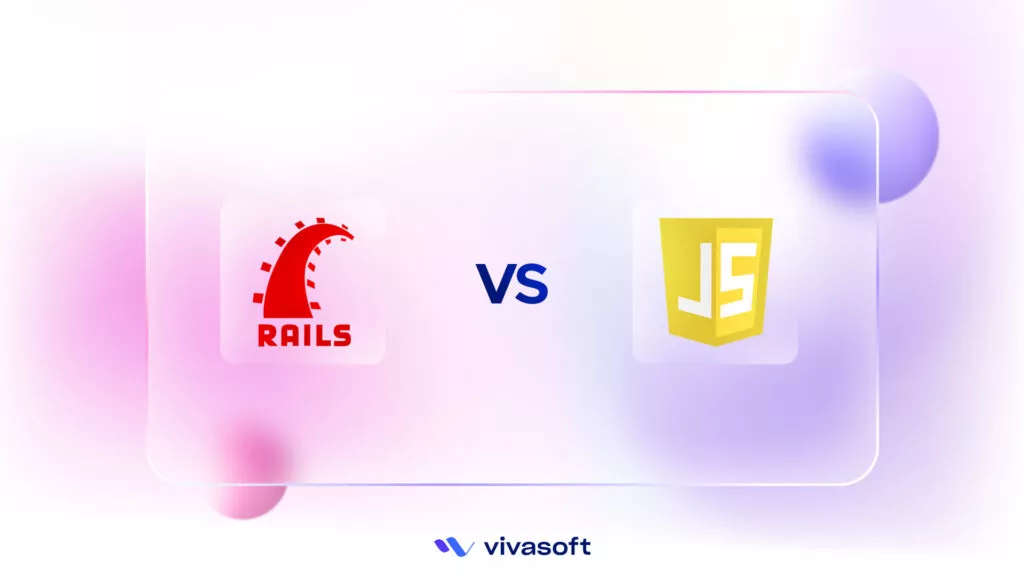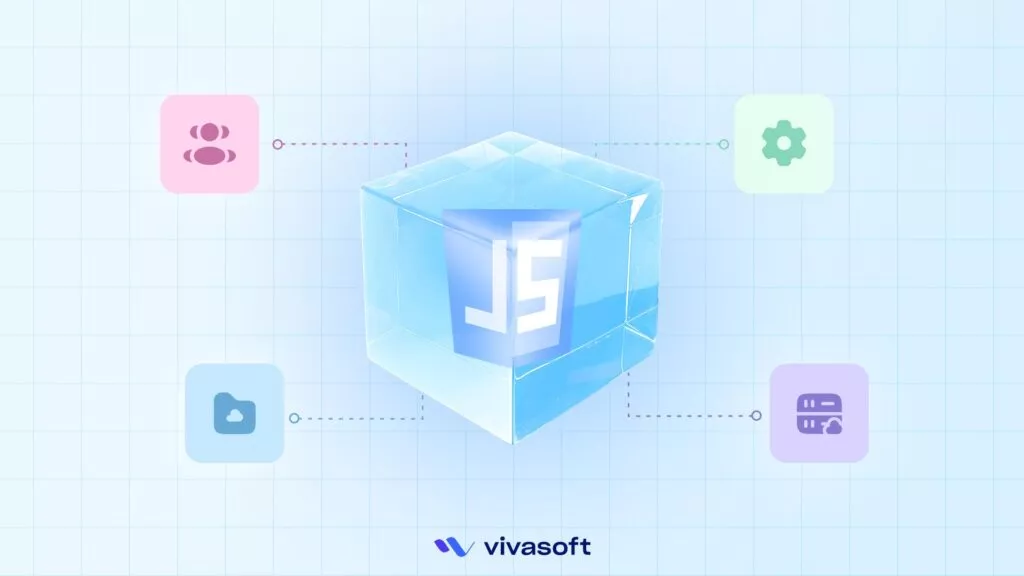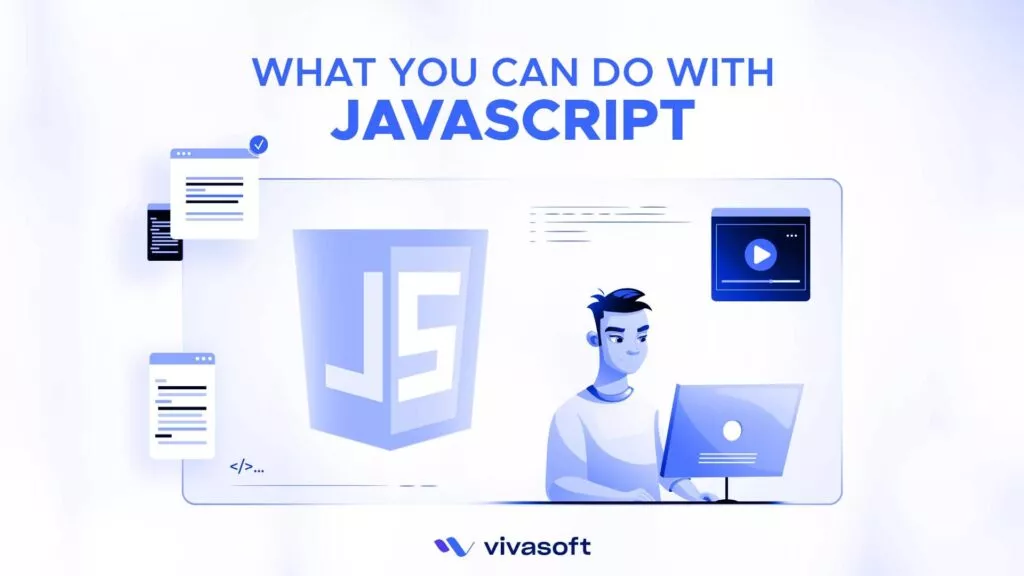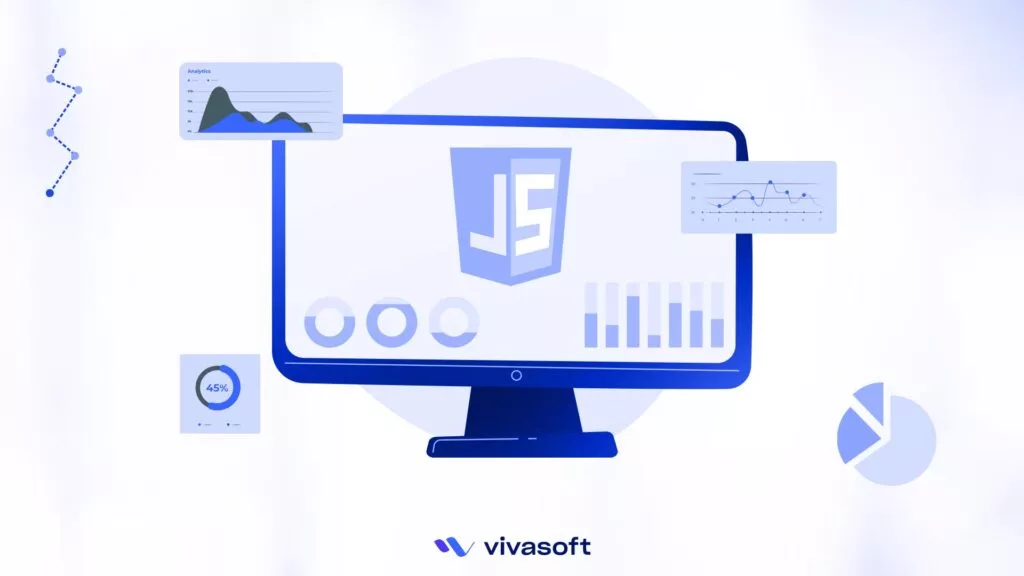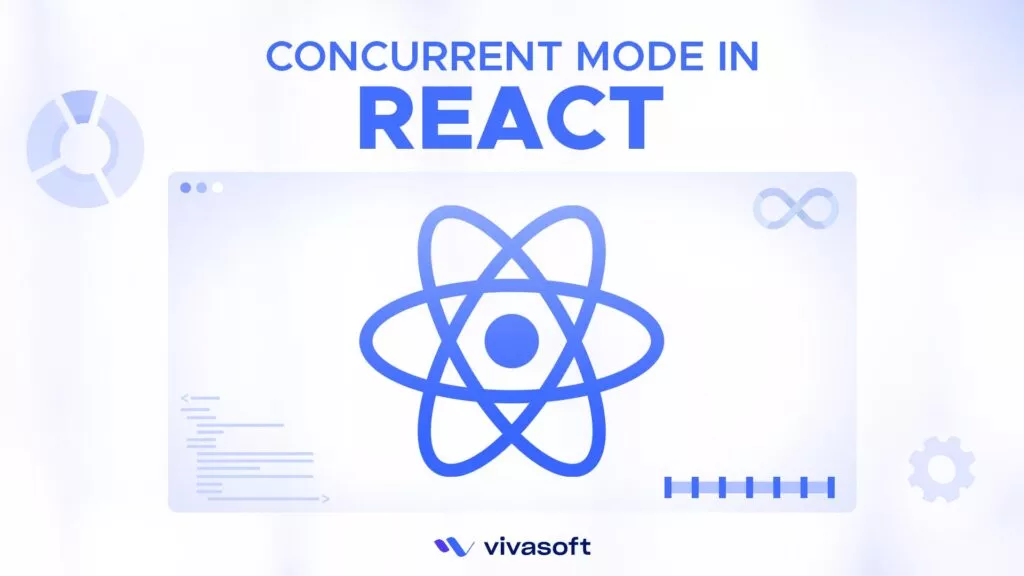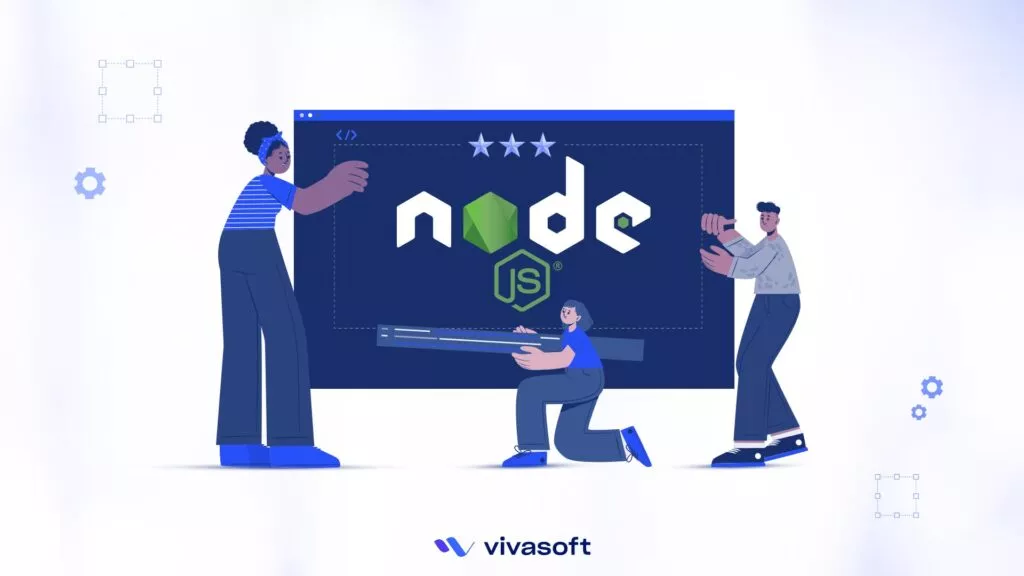JavaScript is right now the most popular programming language among developers. There are widely used frameworks for all aspects of the requirements. Front-end or back-end, desktop or Android, JavaScript has the appropriate framework and a large developer community for it.
With so many JavaScript frameworks available, it can be overwhelming to select the best one for your upcoming project. This article will discuss how to select the ideal JavaScript framework for your upcoming endeavor.
What are JavaScript Frameworks?
In programming, a framework is a pre-built structure that provides developers with ready-made components or solutions, which can be modified to speed up the development of applications for a specific purpose.
Unlike conventional programming, where developers have to manually query a library to access reusable code, frameworks utilize the Inversion of Control (IoC) principle, allowing the framework to call upon custom code whenever it is required.
JavaScript frameworks consist of pre-written JavaScript code and pre-implemented features of various purposes that developers can utilize to build applications of different types. They provide a proper structure for developers to organize their code, making it easier to organize, write, and test complex applications. Frameworks come with pre-defined rules and patterns that help developers to follow best practices and build applications quickly and efficiently.
Most of the widely used frameworks have very well-written documentation which breaks down the usage of different components of itself. Therefore, a programmer with a basic understanding of the corresponding language can easily use and understand the framework with no or little prior experience.
Read More: Top 5 Programming Languages to Use
Why use a Framework in the first place?
Using a framework can save time and effort for developers by offering pre-written code for common functionalities. In addition, it ensures the code adheres to best practices and is maintainable. Frameworks also provide developers with a structure, making it simpler for them to organize and maintain their code. In addition, frameworks typically have a large developer community, which results in an abundance of resources and documentation.
6 Most Popular Javascript Frameworks: Which One is Best?
JavaScript frameworks are essential tools for developers, as they provide ready-made solutions for common web development challenges. They can save significant time and effort, enabling developers to build robust applications more efficiently. With the abundance of options available, it can be challenging to choose the right framework for your project. We’ll explore the most popular JavaScript frameworks that you can choose from to help you make an informed decision.
Read More: 10 Amazing Things You Can Build with JavaScript Programming Language
1. React
React is a widely-used front-end library for building user interfaces. It is maintained by Meta and offers a straightforward approach to constructing UI components that can be reused.
Pros
It has a large community and a wide range of libraries and tools available. It is highly performant due to its virtual DOM and efficient rendering system. It is also flexible and is compatible with a variety of other libraries and frameworks.
Cons
React has a steep learning curve and requires developers to change their strategic view of building the UIs. The setup procedure is a bit tiresome considering other frontend frameworks.
2. Next.js
Next.js allows for the development of full-stack web applications through the utilization of advanced React capabilities and the integration of high-performance Rust-based JavaScript tooling, resulting in expedited builds. It provides features such as automatic code splitting, server-side rendering, and static site generation, which can improve performance and SEO.
Pros
The Next framework facilitates server-side rendering of React apps, thereby enhancing their performance and SEO. The feature facilitates automatic code splitting, thereby enhancing performance. The community boasts a significant and dynamic presence, offering ample resources and support.
Cons
The complexity of Next, compared to other React frameworks, may demand a higher level of proficiency from developers. Not to mention that, the learning curve for this technology is comparatively steep.
3. React Native
React Native is a mobile application framework for building cross-platform mobile applications using React. It allows developers to build mobile applications using JavaScript and provides access to native APIs and components.
Pros
React Native simplifies cross-platform mobile app development by allowing JavaScript. Native APIs and components enhance user experience. It has a large and active community, which provides plenty of resources and support.
Cons
The performance of certain applications may be limited due to their non-native nature, resulting in reduced functionality. It can also require more manual configuration than some other mobile application frameworks.
4. NodeJs
Node.js is a server-side JavaScript runtime that allows developers to run JavaScript code outside of the web browser. It is built on the V8 JavaScript engine, and it provides a non-blocking I/O model that allows for high scalability and performance.
Pros
It is incredibly scalable and can easily manage large-scale applications. It has a large and active community that provides an abundance of resources and support
Cons
It may be more difficult to learn and implement than other server-side technologies. The learning curve is much higher compared to other technologies.
5. Vue.Js
Vue.js is a popular JavaScript framework because of its progressive nature and user-friendliness. Its layout is adaptable and expandable, thus it may be utilized for projects of any size.
pros
It is easy to learn and has a gentle learning curve, making it a popular choice for beginners. It is also highly performant and can handle sophisticated applications. It has several useful built-in features, like routing and state management, that can save developers time.
Cons
Due to its small community, Vue.js can pose a challenge when seeking resources and assistance. Although the framework has several built-in features, it falls short in comparison to other frameworks, necessitating the use of supplementary libraries by developers.
6. Angular
Angular is a TypeScript-based, free and open-source web application framework maintained by Google. It is designed for building large-scale, complex web applications.
Pros
Angular is known for its powerful features such as two-way data binding and dependency injection. It has a well-defined structure and a set of conventions that can help developers write more maintainable code. it includes a ton of built-in capabilities that may save developers time, such testing and routing. It can handle sophisticated applications and is very scalable.
Cons
It can be overwhelming for beginners with all the unique sophisticated features. It can also be slower than other frameworks due to its complexity.

React Vs Next.js Vs React Native Vs Node.js Vs Vue.js Vs Angular
| Framework | Type | DOM Manipulation | Server-side Rendering | Mobile Development | Language | Learning Curve |
|---|---|---|---|---|---|---|
| React | Frontend | Virtual DOM | Yes | React Native | Javascript | Medium |
| Next.js | Full Stack | Server-side | Yes | No | JavaScript | Medium |
| React Native | Mobile | Virtual DOM | No | Yes | JavaScript/JSX | Medium |
| Node.js | Backend | No | Yes | No | JavaScript | Medium |
| Vue.js | Frontend | Virtual DOM | No | No | JavaScript/HTML | Easy |
| Angular | Frontend | Real DOM | No | No | TypeScript | Difficult |
Points to be noted:
- React and React Native are both developed and maintained by Facebook.
- Next.js is a framework built on top of React and Node.js, providing a full-stack solution for building web applications.
- Node.js is a runtime environment for executing JavaScript code outside of a web browser, allowing for server-side JavaScript development.
- Vue.js is known for its simplicity and ease of use, making it a popular choice for beginners.
- Angular is a full-featured and highly opinionated framework, making it a more complex option but also providing a lot of built-in functionality.
How to Choose the Best JavaScript Framework?

1. Understand Your Project Requirements
The first step in selecting the optimal JavaScript framework is to determine the needs of the project. Consider the capabilities and features that your application must possess. A single-page application, a content-driven website, or an e-commerce platform? The type of application you are developing will determine the framework you select.
2. Consider the Learning Curve
Various JavaScript frameworks have varying learning curves. Some frameworks are simpler to master and apply, whereas others require more time and effort. Consider your team’s JavaScript proficiency and experience when selecting a framework. If your team is new to JavaScript, a simplified framework like Vue.js may be the best option. Alternatively, if your team is comfortable with JavaScript, you may want to use a more sophisticated framework such as Angular.
3. Community Support
When selecting a JavaScript framework, community support is a further aspect to consider. Frameworks with large and active communities are more likely to have better documentation, support, and resources. In addition, they typically have more available modules and libraries. This means that it is simpler and more efficient to seek solutions to common problems. Popular frameworks like React and Angular have large developer communities, making them excellent options for the majority of projects.
4. Performance
Optimizing the performance of your application is paramount for its success. Select a framework that prioritizes performance and speed optimization. Although the majority of JavaScript frameworks prioritize speed, there are variations in their performance. React and Vue.js frameworks are renowned for their speed and efficiency, making them favored options for high-performance applications.
5. Compatibility with Other Tools
Considers the tools and technologies that will complement your JavaScript framework. For instance, if you are using a particular database or server technology, ensure that the framework you select is compatible with these technologies. This will save you time and effort in the long run and guarantee that your application is compatible with all of your other tools.
Still Overwhelming?
Even after following all the aforementioned advice, it is highly likely for a non-tech person to select the best Javascript framework according to the project goals, manpower, deadline and budget. Therefore, our suggestion would be to hire a JavaScript development team to make things easy for you and your business.
If you’re looking for a reliable and experienced software development outsourcing company to help you with your Javascript framework selection and development needs, look no further than Vivasoft. With a team of highly skilled developers who are proficient in a variety of Javascript frameworks, Vivasoft can help you select the best framework for your project based on your specific goals, budget, and timeline.
Final Thoughts
Choosing the right JavaScript framework for your project is crucial to the success of your application. Please, remember that there is no one-size-fits-all solution, and you may need to experiment with different frameworks before finding the one that works best for your project.
By partnering with a software outsourcing company, you can rest assured that your project is in capable hands. The team is dedicated to delivering top-quality solutions that meet and exceed your expectations, all while staying within your budget and timeline.
Contact us to find dedicated developers.









